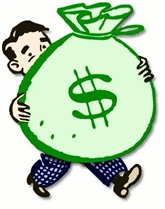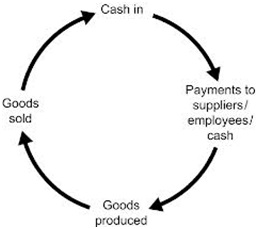|
 |
|
 |
Cash flow management
Cash flow is... An organization’s cash inflows and outflows from its three main activities -operating (or trading), investing and financing:
These inflows and outflows are all included in an organization’s cash flow statement that all companies must publish (see financial accounting). For the year ended 22 February 2014 the key items in the British supermarket Tesco’s cash flow statement were: £million
Insufficient working capital i.e. current assets (cash or easily convertible into cash) less current liabilities (unpaid debts). This results from over-investment in fixed assets (like property and equipment kept for over a year). The Working Capital Cycle The working capital cycle shows how working capital (including cash) circulates around a business. This cycle will look like:
Problems of a cash shortage
1. Credit Difficulty of obtaining credit from suppliers because of the bad feeling caused by delayed payment.
2. Discounts Inability to take advantage of cash discounts.
3. Financial reputation Damage to a firm’s standing in the eyes of potential investors and lenders which will make it more difficult to raise future finance.
4. Profits Inability to pay for supplies and profitable investment opportunities like new products.
5. Borrowing and asset sales Possible necessity of having to borrow or sell assets.
6. Liquidation Possibility of going out of business.
How to avoid a cash shortage
1. Raise
money – from:
2. Delay payment for purchases e.g. credit purchases, hire purchase and leasing (renting equipment).
3. Selling fixed assets You can lease them back under a scheme called sale and lease back.
4. Factoring A finance company buys the debts of your credit customers (or debtors) and becomes responsible for collecting them.
5. Stock control Making sure you have enough stocks (e.g. raw materials and goods to sell) without having too many. Just-In-Time minimizes stocks by getting them delivered only when they’re needed.
6. Credit control – making sure your credit customers pay up.
7. Creditor control – delaying payment to suppliers for as long as possible.
8. Check liquidity ratios (see analysing accounts):
9. Use a cash flow forecast (sometimes called a cash budget) This shows an organization’s monthly planned cash incomes and expenditures for a period of time (usually a year). It will show any future cash shortages, so that any appropriate action can be taken.
Key quotes explained “Customer satisfaction, employee satisfaction and cash flow”, - Jack Welch (General Electric’s ex-boss, pictured right) on the three most important measures of company performance. Notice Welch doesn’t mention profit, because it is automatically created by customer and employee satisfaction.
“Cash before conscience!”, - Horace (Roman poet, pictured right). Principles may be lost in the dash for cash.
“The cheque is in the post”, - Richard Branson, pictured right (his favourite phrase in the cash strapped early years of his company, Virgin).
| ||||||||||||||||||||
|
|
||
|
|
|
||
|
||
| Copyright © wisdomtowin.com All Rights Reserved | ||
|








